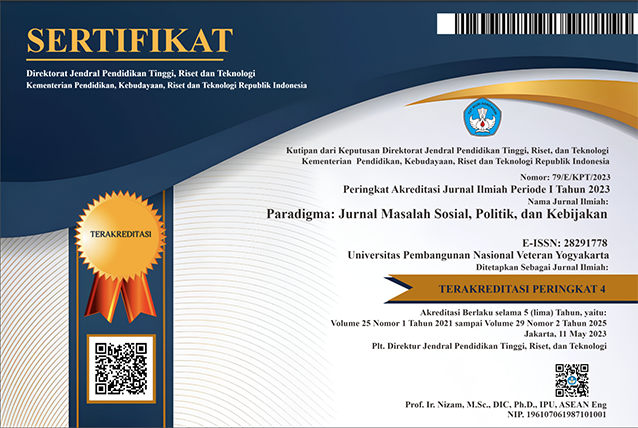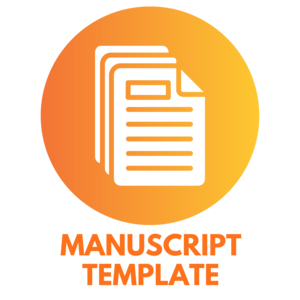KERJASAMA GENERAL SECURITY OF MILITARY INFORMATION AGREEMENT (GSOMIA) KOREA SELATAN-JEPANG : PERSPEKTIF KOREA SELATAN
DOI:
https://doi.org/10.31315/paradigma.v27i1.7999Kata Kunci:
Hubungan InternasionalAbstrak
Kerjasama General Security of Military Information Agreement (GSOMIA) merupakan kerjasama militer antara Korea Selatan dan Jepang. Pada mulanya kerjasama tersebut akan dilaksanakan pada era Presiden Lee Myung-bak, akan tetapi kerjasama tersebut gagal dilaksanakan karena adanya penolakan dari pihak domestik Korea Selatan. Pada tahun 2016, kerjasama tersebut kembali dibahas pada era Presiden Park Geun-hye. Pihak domestik Korea Selatan tidak menyetujui kerjasama tersebut, akan tetapi Presiden Park Geun-hye tetap menandatanganinya pada November 2016. Penelitian ini bertujuan mengetahui latar belakang Presiden Park Geun-hye menyepakati kerjasama tersebut. Adapun metode penelitian dilakukan dengan library research, dan analisis menggunakan Teori Model Aktor Rasional oleh Graham T Allison. Penelitian menunjukkan bahwa terdapat dua alasan bagi Korea Selatan menyepakati GSOMIA, yakni kemampuan militer Jepang dan adanya peningkatan aktivitas nuklir dan rudal Korea Utara di Kawasan Asia Timur, khususnya Semenanjung Korea.
Kata kunci: GSOMIA, Kerjasama Militer, Korea Selatan, Jepang
Referensi
ACA. (2022). Chronology of US-North Korea Nuclear and Diplomacy. https://www.armscontrol.org/factsheets/dprkchron#2012
Al Syahrin, N. (2018). Keamanan Asia Timur : Realitas, Kompleksitas dan Rivalitas. Komojoyo Press.
Arirang Issue. (2016). President Park Geun-hye on North Korea. https://youtu.be/h6nbQe4u3Tk
Atmolov, K. (2019). A Tense Time for Relations Between Japan and South Korea : The GSOMIA and Moon’s Relations with USA. https://journalneo.org/2019/09/12/a-tense-time-for-relations-between-japan-and-south-korea-the-gsomia-and-moon-s-relations-with-the-usa/
BBC. (2018). South Korea’s Presidental Scandal. https://www.bbc.com/news/world-asia-37971085
Byong-Su, P. (n.d.). Seoul and Tokyo Agree on Major Terms Military Information Agreement. https://english.hani.co.kr/arti/english_edition/e_national/769710.html
Defense, M. of. (2016). National Security Strategy. https://www.mod.go.jp/en/d_policy/basis/strategy/index.html
Gallup Report. (2016). Daily Opinion No.236 Korea-Japan Military Cooperation. http://www.gallup.co.kr/gallupdb/reportContent.asp?seqNo=789
Genron NPO. (2013). Japan & South Korea Joint Opinion Poll. https://www.genron-npo.net/en/opinion_polls/archives/5263.html
Hyung, G. Y. (2016). South Korea and Japan First Hold Round of Talks on Military Info Sharing Agreement. https://english.hani.co.kr/arti/english_edition/e_international/768470.html
Ians. (2017). Seoul Develops Radar Syste, to Detect Pyongyang Artillery. https://www.financialexpress.com/world-news/seoul-develops-radar-system-to-detect-pyongyang-artillery/639588/
In-Hwan, J. (2016). Despite Criticism, South Korea Sign GSOMIA with Japan. https://english.hani.co.kr/arti/english_edition/e_national/771627.html
Irawan, S. (2017). Reformasi Aliansi Pertahanan Amerika Serikat-Jepang-Korea Selatan Menghadapi Nuklir Korea Utara. Jurnal International & Diplomacy USNI, Vol.3 No.1, 103.
Ju-Min, P. (2016). South Korea, Japan Agree Intelligence-Sharing on North Korea Threat. https://www.reuters.com/article/us-southkorea-japan-military-idUSKBN13I068
Jun, M. Y. (2012). History Intrudes on Korea-Japan Security Cooperation. https://www.stimson.org/2012/history-intrudes-korea-japan-security-cooperation/
Korea JoongAng Daily. (2016). Park Was Behind Rush to Conclude GSOMIA, Says Official. https://koreajoongangdaily.joins.com/news/article/article.aspx?aid=3026296
Kumagai, N. (n.d.). South Korea and Japan: Resolving the Comfort Women Issue. 2020.
Laimeheriwa, O. L. (2015). Analisis Penyerangan Rudal Balistik Korea Utara terhadap Korea Selatan (Periode 2010-2015. Jurnal Korean War Kajian Strategis Dan Studi Keamanan, 9.
Ministry of Defense Japan. (2014). Medium Term Defense Program. https://warp.da.ndl.go.jp/info:ndljp/pid/11591426/www.mod.go.jp/j/approach/agenda/guideline/2014/pdf/Defense_Program.pdf
Ministry of Defense Japan. (2016). Defense Program and Budget of Japan. https://www.mod.go.jp/en/d_act/d_budget/pdf/280330.pdf
Ministry of National Defense Republic of Korea. (2016). Defense White Paper 2016. https://www.mnd.go.kr/cop/pblictn/selectPublicationUser.do?siteId=mndEN&componentId=51&categoryId=0&publicationSeq=777&pageIndex=1&id=mndEN_031300000000
Moon Chung-In dan Won Young Hur. (2017). A South Korean Perspective : Trilateral Co-operation : the Devil’s in Domestic Politic. https://www.globalasia.org/v12no1/cover/a-south-korean-perspective-trilateral-co-operation-the-devils-in-domestic-politics_chung-in-moon-won-young-hur
NATO. (2021). Defense of Expenditure of NATO Countries (2014-2021). https://www.nato.int/cps/en/natohq/news_184844.htm
Nayoon, L. (2016). GSOMIA: Beneficial But Was The Timing Right ? https://keia.org/the-peninsula/gsomia-beneficial-but-was-the-timing-right/
Sangbo, P. (2016). Implications of General Security of Military Information Agreement for South Korea. https://www.stimson.org/2016/implications-general-security-military-information-agreement-south-korea/
Santoso, R. dan A. A. B. P. (2016). The Shift and Continuity of Japanese Defense Policy : Revolutionary Enough ? Journal of ASEAN Studies, Vol.4 No.2, 163.
Setiawan, A. dan E. S. (2017). Pengantar Studi Politik Luar Negeri. UMJ Press.
Sheen Seongho dan Jina Kim. (2012). What Went Wrong with the ROK-Japan Military Pact. https://www.eastwestcenter.org/system/tdf/private/apb176.pdf?file=1&type=node&id=3360
Shin-H. (2012). Seoul Under Fire for Tokyo Military Pact. http://www.koreaherald.com/view.php?ud=20120628001308
Sugiyono. (2011). METODE PENELITIAN KUANTITATIF DAN KUALITATIF DAN R&D (ALFABETA (ed.); cetakan ke). ALFABETA.
Taqwim, A. N. (2019). https://dspace.uii.ac.id/handle/123456789/14218 [Universitas Islam Indonesia]. https://dspace.uii.ac.id/handle/123456789/14218
Yoon, Yang Seung dan Setiawati. (2003). Sejarah Korea Selatan Sejak Awal Berdiri Hingga Masa Kontemporer. Gajah Mada Univ Press.
Unduhan
Diterbitkan
Cara Mengutip
Terbitan
Bagian
Lisensi
The manuscript submitted to Paradigma: Jurnal Masalah Sosial, Politik, dan Kebijakan journals are released under the license of Creative Commons Attribution-Non Commercial- ShareAlike (CC BY SA) if and when the article is accepted for publication.
We declare that:
- This paper has not been published in the same form elsewhere.
- It will not be submitted anywhere else for publication prior to acceptance/rejection by this Journal.
- A copyright permission is obtained for materials published elsewhere and which require this permission for reproduction.
Retained Rights/Terms and Conditions
Authors retain all proprietary rights to the published works, such as (but not limited to) the following rights:
- Copyright and other proprietary rights relating to the article, such as patent rights,
- The right to use the substance of the article in own future works, including lectures and books,
- The right to reproduce the article for own purposes,
- The right to self-archive the article
The right to enter into separate, additional contractual arrangements for the non-exclusive distribution of the article's published version (e.g., post it to an institutional repository or publish it in a book), with an acknowledgment of its initial publication in this journal Paradigma: Jurnal Masalah Sosial, Politik, dan Kebijakan



